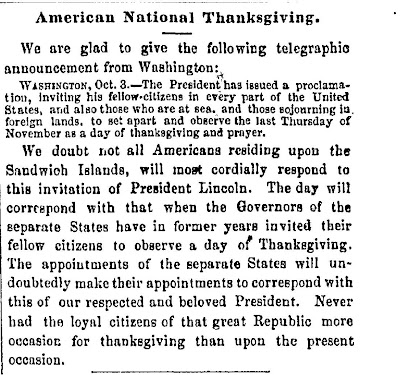1863 Proclamation Declared Thanksgiving a National Holiday
While Lincoln issued the proclamation, credit for making
Thanksgiving a national holiday should go to Sarah J. Hale, the editor of
Godey's Lady's Book, a popular magazine for women in 19th century America. Hale,
who campaigned for years to make Thanksgiving a nationally observed holiday, wrote to Lincoln on September 28, 1863 and urged him to
issue a proclamation. Hale mentioned in her letter that having such a national
day of Thanksgiving would establish a "great Union Festival of
America."
With the United States in the depths of the Civil War, perhaps Lincoln
was attracted to the idea of a holiday unifying the nation. At that time
Lincoln was also contemplating delivering an address on the purpose of the war
which would become the Gettysburg Address.
Lincoln
wrote a proclamation, which was issued on October 3, 1863. The New York Times
published a copy of the proclamation two days later.
October 3, 1863
By
the President of the United States
A Proclamation
A Proclamation
The
year that is drawing toward its close has been filled with the blessings of
fruitful fields and healthful skies. To these bounties, which are so constantly
enjoyed that we are prone to forget the source from which they come, others
have been added, which are of so extraordinary a nature that they cannot fail
to penetrate and soften the heart which is habitually insensible to the
ever-watchful providence of Almighty God.
In
the midst of a civil war of unequaled magnitude and severity, which has
sometimes seemed to foreign states to invite and provoke their aggressions,
peace has been preserved with all nations, order has been maintained, the laws
have been respected and obeyed, and harmony has prevailed everywhere, except in
the theater of military conflict; while that theater has been greatly
contracted by the advancing armies and navies of the Union.
Needful diversions of wealth and of strength from the fields of
peaceful industry to the national defense have not arrested the plow, the
shuttle, or the ship; the ax has enlarged the borders of our settlements, and the mines, as well of iron
and coal as of the precious metals, have yielded even more abundantly than
heretofore. Population has steadily increased, notwithstanding the waste that
has been made in the camp, the siege, and the battlefield, and the country,
rejoicing in the consciousness of augmented strength and vigor, is permitted to
expect continuance of years with large increase of freedom.
No
human counsel hath devised, nor hath any mortal hand worked out these great
things. They are the gracious gifts of the Most High God, who while dealing
with us in anger for our sins, hath nevertheless remembered mercy.
It
has seemed to me fit and proper that they should be solemnly, reverently, and
gratefully acknowledged as with one heart and one voice by the whole American
people. I do, therefore, invite my fellow-citizens in every part of the United
States, and also those who are at sea and those who are sojourning in foreign
lands, to set apart and observe the last Thursday of November next as a Day of
Thanksgiving and Praise to our beneficent Father who dwelleth in the heavens.
And I recommend to them that, while offering up the ascriptions justly due to
Him for such singular deliverances and blessings, they do also, with humble
penitence for our national perverseness and disobedience, commend to His tender
care all those who have become widows, orphans, mourners, or sufferers in the
lamentable civil strife in which we are unavoidably engaged, and fervently
implore the interposition of the Almighty hand to heal the wounds of the
nation, and to restore it, as soon as may be consistent with the Divine
purposes, to the full enjoyment of peace, harmony, tranquility, and union.
In
testimony whereof, I have hereunto set my hand and caused the seal of the
United Stated States to be affixed.
Done
at the city of Washington, this third day of October, in the year of our Lord
one thousand eight hundred and sixty-three, and of the Independence of the
United States the eighty-eighth.
Abraham Lincoln














